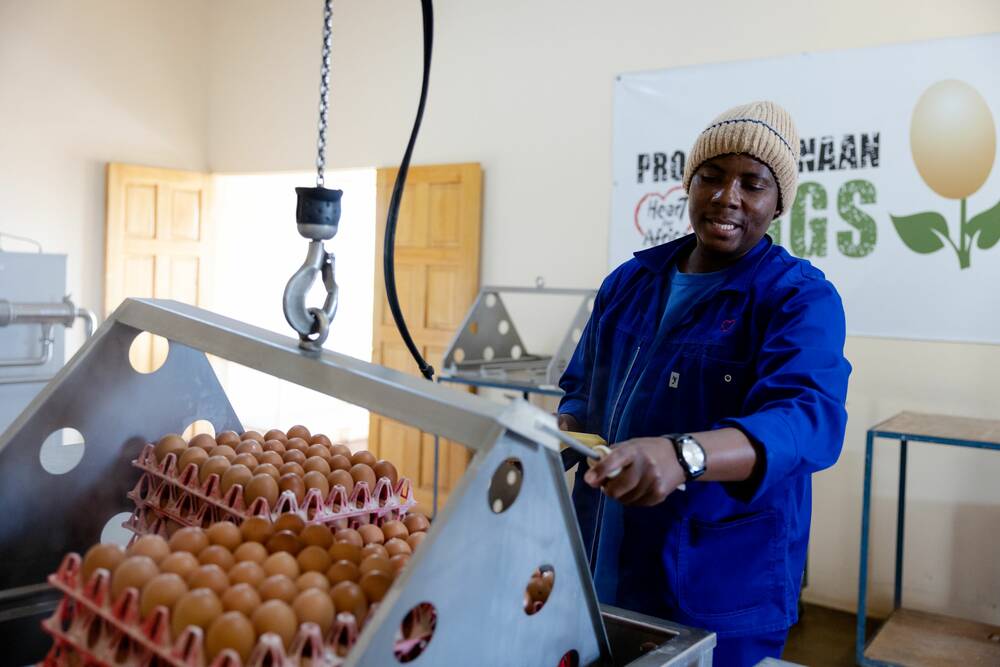Canadian egg farmers celebrate Eswatini partnership

In 2013, a plane carrying two representatives from the Egg Farmers of Canada landed in Eswatini in southern Africa.
Read Also


U.S. to spend $7.3 billion on rural clean energy projects
Reuters – President Joe Biden’s administration on Thursday said the U.S. will spend $7.3 billion from 2022’s Inflation Reduction Act…
They were exploring a partnership with Project Canaan, a philanthropic effort aimed to improve nutrition in the country’s vulnerable populations. Egg Farmers of Canada had become interested in the initiative earlier that year, after being introduced to it at an industry conference.
Why it matters: Egg Farmers of Canada is a decade into its partnership to tackle food insecurity in Eswatini, Africa, formerly known as Swaziland.
The tour came on the heels of a similar visit to Mozambique, where an American-based partnership, Eggs for Africa, was already producing eggs and poultry, ready protein for that nation’s at-risk children.
If the Americans could do it in Mozambique, thought Canadian egg farmer Roger Pelissero, there was no reason Canadians couldn’t do it in Eswatini.
“We’d seen an opportunity and felt compelled to get involved,” said Pelissero, who now sits on the Canadian board of Heart for Africa, a Christian-based non-profit focused on alleviating poverty and hunger and providing education and care for orphans in Eswatini.
Started by Canadians Janine and Ian Maxwell, Heart for Africa’s Project Canaan covers 2,500 acres near Gebeni in the Mansini region of the country and employs 470 people. The site has housing, a school and a farm designed to promote self-sustainability, according to Heart of Africa’s website.
The farm includes two acres of greenhouse space, a seedling house, 30 acres of irrigated field crops and livestock, including cattle and goats. Egg Farmers of Canada’s contribution comes as part of the farm’s more than 6,200 layer hens.
The Canadian industry group officially started partnering with the farm in 2014. Today, the facility boasts two barns and produces 4,500 eggs a day. It feeds 4,500 children across the rural areas of the country.
Egg Farmers of Canada provided funds and expertise for the egg production facility, Heart of Africa says.
“It’s been a very interesting 10 years. (We’ve) learned lots and I’m sure there’s still lots to learn,” said Ian Maxwell.
Egg Farmers of Canada helped design the farm’s barns and sent resources to bolster the project.
“(Canadian) farmers donated their time to go over and help install equipment, help train the staff that are there now, running the barns,” said Pelissero.
The need
Eswatini is landlocked by its neighbours, South Africa and Mozambique. In 2016, a report from the U.S. Food and Agriculture Organization noted several decades of agricultural decline in the country, exacerbated by repeated droughts.
The Integrated Food Security Phase Classification, a system developed by the FAO to gauge the food insecurity status of countries, found in 2019 that less than half the population of Eswatini was food secure. In the most recent period (June-September ), it estimated that almost 243,500 people, about 20 per cent of the population, meet the classification for “crisis,” the third level on a five-point scale.
Under that classification, at least 20 per cent of households consume less than 2,100 calories a day and either more people are malnourished than usual or 10-14.9 per cent have slipped into acute malnourishment.
Innovative solutions
For the egg facility at Project Canaan, shelf life was a major concern. Most of the people they wanted to help in rural Eswatini don’t have refrigeration. Transportation also required creativity. Rural roads are rough, Maxwell noted, and eggs are delicate.
Working with food scientists, they developed a process to hard boil and preserve the eggs by forming a gel between the egg’s shell and membrane. Under that process, eggs can last up to six weeks without chilling.
Most of the collected eggs are sent to 30 distribution spots known as cooking stations. Before the egg project, dry goods packets with grains and vegetables from the farm were distributed.
Technology at the farm is kept simple, Maxwell noted, because maintaining jobs is one of the priorities.
Pelissero gave the example of the farm’s feed cart. In Canada, there would likely be a motorized option. At the African farm, keeping it manual maintains work opportunities and reduces the need for repairs and hard-to-get parts.
Pelissero has video calls with the egg barn manager, Sifiso, about every six weeks. They discuss how the barn is running, any issues encountered and the health of the chickens. Content of those discussions filters down to the rest of the staff.
“(Sifiso is) now training people and then he’s also taking that knowledge home to his community,” said Maxwell. “… the ripple effect of this is (that), over the years, the ripple’s getting bigger.”
Bid flu has been a more recent challenge, one that the Canadian and American feather sectors have also struggled to manage in the last few years. The disease created complications in getting new laying hens, usually obtained from South Africa.
The last two years have been particularly bad. To reduce border crossings, they’ve instead partnered with an egg and bird producer in Eswatini.
Today, biosecurity at the farm could rival any North American operation. There are drive-through baths for in and out traffic. The facility is fenced off, and Canadian-based food safety and biosecurity programs are in place. Those employed at the barns take biosecurity very seriously, said Pelissero.
“I’d say, you know, we built (at a) 1960 or ‘70 production style, but as far as the standards that they’re following, (those) would be current and up to date 100 per cent.”
Looking ahead
Success of the project is seen in potential growth and in benefits to the community, Maxwell said. Local economic development has been strong.
“It gets dark when you live in rural areas,” said Pelissero of his past six visits. “But you would see a few lights on in the hillsides. And from then until my last visit last fall, there’s a lot more lights on in the hillsides.”
Maxwell and Pelissero are looking to the future. There is discussion about expanding egg production with the addition of a third barn, but they need to figure out logistics.
Pelissero said the Egg Farmers of Canada will be brainstorming next steps soon.
Source: Farmtario.com

